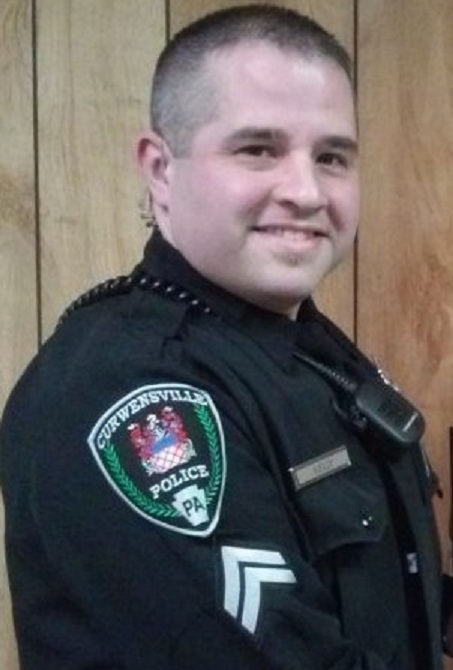
CURWENSVILLE – Former Police Chief Mark Kelly will return to the Curwensville Borough Police Department, but at a reduced rank.
The Curwensville Borough Council voted unanimously to reinstate Kelly at the rank of patrolman following a 20-minute executive session at a special meeting Friday.
The council also shed some light on the incident, which led to Kelly’s demotion and the actions that led to Friday’s meeting.
Upon returning from the executive session, council member Harriet Carfley made a motion to reinstate Kelly, which was favorably received by the 8-10 members of the public present at the meeting.
However, Carfley then made a second motion to demote Kelly from chief to patrolman, but at his present rate of pay. Council member Dave Donahue was not present at the meeting.
Carfley said she was making the motion to demote Kelly “because he did not perform his duties as an officer by not detaining a state parolee as per the request of a state parole officer while he (Kelly) had the state parolee in his custody.”
When questioned by members of the public, Solicitor Ryan Sayers said the council was not legally able to divulge this information at Monday’s meeting, due to the pending grievance filed by Kelly following the council’s decision to terminate his employment as police chief at a special meeting July 15.
Under the Pennsylvania Sunshine Law, the council has the right to discuss pending litigation and personnel issues in executive session. However, any action taken by the council must be done in public and the council must give a reason for this action.
Under the civil service provision in the borough code, there are seven categories in which an officer may be terminated. Inefficiency, neglect, intemperance, immorality, disobedience of orders or conduct unbecoming of an officer is one of those categories.
Due to the pending grievance, this was the only explanation the council was permitted to give when the decision to terminate Kelly was made.
Sayers said the council’s decision to reinstate Kelly as a patrolman resolves this grievance and allows the council to further explain the circumstances, which led to Kelly’s termination.
When a member of the public asked if Kelly would have the opportunity to defend himself against these allegations, Sayers explained that Kelly had that opportunity during a Loudermill hearing, which was held prior to the special meeting July 15.
According to the Pennsylvania Mayor’s Manual, under the due process clause of the U.S. Constitution, before a mayor can suspend a police officer, he/she must conduct a pre-disciplinary hearing, known as a Loudermill hearing.
A Loudermill hearing requires that a police officer: a) be informed of the charges against him/her; b) have an explanation of the mayor’s evidence against him/her; and c) be given the opportunity to present his/her side of the story.
Following the Loudermill hearing, a written statement of charges made against the officer must be furnished to him/her within five days after the statement of charges is filed 8Pa C S §1190(c).
The officer shall then have 10 days from the date of receiving the notice to submit a written request for a hearing to the civil service commission under the section of the borough code relating to hearings on dismissals and reductions 8Pa C S §1190(c).
It was not specified whether it was the mayor or the council who called the Loudermill hearing. However, it was the council that voted 6-0 to terminate Kelly during the special meeting July 15.
At Monday’s (July 22) meeting, Mayor John Adams made a statement saying he was reinstating Kelly, which led to several heated exchanges between Adams, members of council and the public.
The exchanges became so heated, that council President Sarah Curulla had to bang her gavel several times and a member of the public was escorted from the meeting by the borough’s remaining police officer.
At Friday’s meeting, Sayers said it was determined that the mayor did not have the ability to reinstate an officer after the council has voted to terminate them.
According to the Mayor’s Manual, “the council may remove, suspend or reduce in rank any police officer as provided by law subject to any applicable civil service statutes.”
The manual also says the mayor can suspend police officers but outlines a procedure in which the council may reinstate an officer or uphold the mayor’s recommendation.”
Sayers said the decision to hire or fire police officers is “purely that of the council.”



